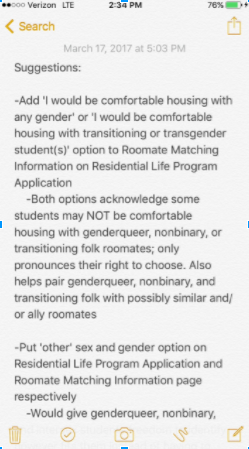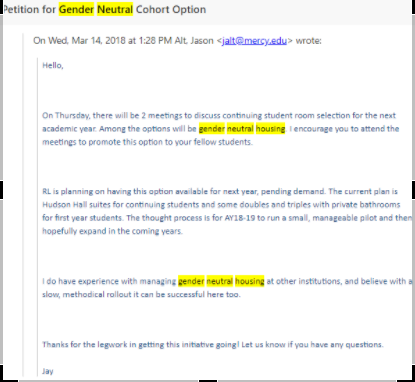Mercy’s Transgender Community Gain a Massive Victory Towards Gender-Neutral Housing
Mercy College has taken great pride in being a school that shows off its diversity. Whether it be in the form of the Black Student Union, Caribbean Student Union, or GLOW UP, Mercy has always tried to take the proper steps towards creating a safe space for students.
But for students at Mercy like Evan, the struggle is still existent for Mercy’s transgender students.
“My mom knows about my bisexuality, but she refuses to say the word. I tried to tell my dad I was transgender, but he denied it. He doesn’t believe in it. It’s hard to get new people in my life to use the correct pronouns, so I often end up getting misgendered by everybody.”
Along with the confusion that follows being transgender, Evan is also non-binary, which is explained by them as, “being outside of the gender binary of being a man or a woman, so, you could identify as a mix, or neither.” This means the pronoun preferred by Evan is they/them/their.
Evan feels that Mercy still needs to do a lot to create a safe environment as well for transgender students, as education about the topic needs to continue. But they also know the realities around them.
“There will never be a perfectly safe space with cisgender people in the same area, but that isn’t the goal at the college, and it isn’t mine either. But there are still plenty of people around here that say homophobic and transphobic slurs. Teachers who misgender students, even if they are asked ahead of time to say them. There are events that are held to promote discussion, but they aren’t advertised a lot, and the people who want to go can go, but people who are closed minded can avoid them easily.”
According to interviews by The Impact with students who are in this community, those who don’t identify with a gender feel that their only options are to be placed with a gender that they don’t identify with, or to live in a single room on campus, which not only has communal bathrooms, but is also more expensive than any other option available for students. They have to deal with the fear of harassment from students, friends, and even their own family.
But in a process that has spanned back for well over a year, three Mercy students have made the push for change. One that will see students be able to participate in Gender-Neutral Housing in Hudson Hall starting next semester.
Seniors Sam Perez and Toni Pellegrino, along with Freshman Haleigh Brown, have all been lobbying for Gender-Neutral Housing. For those unaware of what this is, Brown gives an easy-to-remember definition, “it is a safe and comfortable environment for transgender students to live so they are not living in an area that misgenders them, and they are safe from unaccepting students.”
Since the University of California, Riverside became the first public school to put in place Gender-Neutral Housing back in 2005, there has been a massive increase in the number of schools offering this to students. According to CampusPride.org, 256 Colleges/Universities feature some form of gender-inclusive housing.
What’s important to note is that gender-neutral housing is not meant to be confused with Co-Ed Dorming. This was emphasized by Pellegrino, “This wasn’t an excuse for guys to live with their girlfriends. This is for safer living on campus. That whole hallway would inadvertently become a safe space.”
Despite Perez, Pellegrino, and Brown, having different paths, they all came together by one common goal: Mercy’s GLOW UP club.
GLOW UP (Gay, Lesbian, Or What U Prefer,) had been gone before Pellegrino’s arrival to the school in 2014. However, it didn’t talk long for the then ambitious freshman to revive the club as President. She continued to run it until this school year, where current President, Sam Perez, has been in charge since September.
When The Impact covered the revival of GLOW UP back in 2014, the words said by Pellegrino still reflect her to this day, “I want to everyone to understand this. My goal is to educate, not escalate. All students are welcome and I would love to have them.”
Brown and “Evan” came into the picture by being members of the club during this previous year. Despite this being Brown’s first, and last year, at Mercy before transferring, helping to implement Gender-Neutral Housing was a goal from day one. “Toni and I were at a BBQ for the Social Justice Club, and we were discussing how the school lacked gender-neutral housing, and how it would improve the living situation for trans students. Because the current option is to either live in the area of your assigned sex, or live in a single that not only has communal bathrooms, but is also the most expensive.”
But as pointed out by Pellegrino, her push for this new form of housing goes back to when she was still president last year. “I really want to make it so that Mercy doesn’t keep dealing with transgender students on a case by case basis. I think gender-neutral housing, whether it’s a hallway in Hudson, just throw a sign on it and tweak the housing packet when you first apply. I mean the packet you get, it doesn’t even mention an ‘other’ option for gender. Recently, there’s been a creation of an Inclusion and Equality Committee.”
Despite no appearance of an “Inclusion and Equality Committee” on the Mercy College website, Pellegrino pointed out this because she, as President of GLOW UP, was approached to help redesign the Housing Packet. Following a meeting with Student Life, Pellegrino was told to give suggestions.
She went over the Housing Packet and left suggestions where ever saw fit. Yet she adds that it was not followed up on. She doesn’t say she was ignored, just that it’s a long process and that Student Life was “deliberating with the Committee.”

With an increasing workload and a change in major occurring, Toni’s time was limited, leading to Sam Perez taking over as GLOW UP’s second President. Despite her becoming the face and leader of GLOW UP, her participation in the club previously was limited, but when it came time to elect a new leader for this school year, all the pieces came together for Perez to be elected to the position.
Although Perez collaborated with Pellegrino and Brown, the issue of Gender-Neutral Housing did not stand out right away for GLOW UP’s newest leader. But Perez aimed to changed that. “I work at the Residential Life Office here on campus and I spoke to my supervisor. She just said that, in order for something to be done, the students, the Student Government, needs to propose the idea, and come up with a concrete idea of how to do this.”
That supervisor, Najja Beaulieu-Hains, the Room Director for Hudson Hall, told Perez that the idea was “incredible.” She said the idea should be brought toward Student Government.
As this was happening, Pellegrino and Brown were coming up with their own plan to push their cause forward.
“[Toni and I] wanted to pursue it together, and our advice was to get a petition together and find students and faculty who would support it. [The Counselors for Social Justice] told us that if a college didn’t want to do it, their first excuse would be a lack of budget. So we were told to come up with a counterargument for that.”
This, combined with Perez’s strong belief that GLOW UP needed no one to speak for them aside from themselves, and a collaboration was on the cards. The master plan was now in place: create a petition.
A petition was not a new idea. In fact, Pellegrino had attempted this before. But one issue stood in her way: participation from the student body. “I’ve seen attempts on part of the staff, but it’s hard to get anything done with student involvement. Beyond me, beyond a few people in GLOW UP, it’s hard for people to open up. I’ve been wanting to do a petition for a few issues since freshman year, but I could not get anything off the ground.”
This point was reemphasized in an interview with Perez, according to her, the school had already made plans to pursue this goal. With a combination of student interest, it would help to show it was worth pursuing for the school.
When asked if perhaps a fear from students could cause it, Pellegrino was quick to point out, “It’s not every dorm – it’s a hallway in Hudson.”
The plan it still looking to be implemented. According to Pellegrino, there was a simple solution, “a box students could check off if they were comfortable living with students who are transgender.” This would be on the form for living in Hudson Hall; one would decide if they would be comfortable living with somebody who didn’t identify as a male or female by checking off a box. From there, students would be assembled based on the response the school received.

From there, Brown and Pellegrino created a petition. Starting on February 24, 2018, they were given a deadline to receive 60 signatures by March 5 for the school to consider taking further action. Not only was this number met, it was exceeded within a few days of the petition even being made public to sign. According to Pellegrino, “over 100 at Mercy College signed.”
Between the efforts of Brown and Pellegrino going around the school looking for names, and Perez and Taylah Cox gaining signatures during the GLOW UP Bake Sale, it became a simple step in what was a lengthy and difficult process.
Following an email to Jay Alt, the Assistant Dean of Student Affairs, from Toni Pellegrino, explaining the success of the petition, a long-awaited response was received, “RL is planning on having this option available for next year, pending demand. The current plan is Hudson Hall suites for continuing students and some doubles and triples with private bathrooms for first-year students. The thought process is for AY18-19 to run a small, manageable pilot and then hopefully expand in the coming years. I do have experience with managing gender neutral housing at other institutions, and believe with a slow, methodical rollout it can be successful here too.”

At the Hudson Hall Housing Meeting on March 15, it was announced to students that the school would offer this choice for the upcoming year.
When The Impact recently interviewed Alt, he went more in-depth with how this new system will work. During the process, he reiterated that it was only a pilot, but there are plans to expand upon just the Gender-Neutral option if this plan succeeds. He cited his time at SUNY Purchase as an example of a positive result, but he also made a fair point: there is a possibility it may not work out. He mentioned a “confusion on how to sign up,” and a potential lack of students at that are willing to sign up for it.
A potential meeting could be set to take place soon. But with such little time before the end of the semester, it is looking very difficult, said Alt. “Not being able to advertise” was an issue he believed an extra meeting could solve.
“The concept sounded good, but putting it together was difficult.”
The plan, if this pilot succeeds, is to set up Gender-Neutral Housing for Founders Hall, Hudson Hall, and even the hotel. This would not only ensure that students could have a choice based on where they like the most, but it also may be financially better for students in the long haul.
He also emphasized that people could try to exploit it to live with a partner, despite a repeated claim that it isn’t the intention of gender-neutral housing. “We have a lot of followers, but a lot of assumptions.”
With all of this in mind, no change can be effective without keeping in mind the people that will be affected.
It’s easy to forget about people like Evan. For starters, the three people who have led this movement didn’t even have a number to give of how many transgender students Mercy has, with estimates ranging from “3” to “60.” Jay Alt pointed out at Purchase, that by the time he left, Purchase had about 20 students living in their Gender-Neutral Housing.
Transgender students expressed their fear and refusal in regard to speaking on the record about the issue. Many stated they would rather live alone then let other people find out their business.
Evan added that solving all problems but may be impossible, but it can always improve. “It’s a much bigger problem. We’ve been raised in a two-gender dichotomy based on Western society. People aren’t open to new ideas because they’re set on the idea that trans women are men in dresses. That trans men and just confused women. That trans people are just gay. That you only have two logical options.”
They add, “Gender essentialism and expectations are the real problems, we were born babies, not men and women. Gender construction is reinforced to oppress one class over another, if we have freedom with it, cisgender men’s power is threatened.”
When asked if the changes being made by Mercy College were at least helpful, Evan said yes, saying it’s the right step towards making Mercy safer.
Evan gave a simple and clear tip for those struggling. “Safety is your first concern, which includes not only a safe environment, but also, being mentally healthy, which can be more difficult. So, find a safe place, if you want to come out and it will help you mentally; if you want to transition, it will make it easier. Coming out is not your biggest milestone. Being happy is.”

Steven Keehner was the Managing Editor of the greatest publication on the Hudson.
Hailing from the mediocre Town of Oyster Bay, New York, he enjoys...








